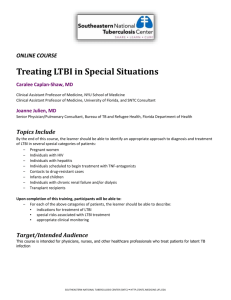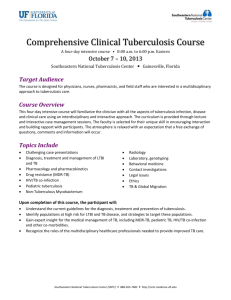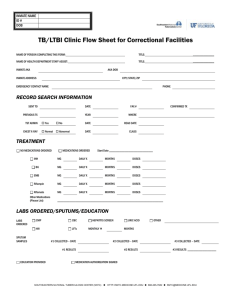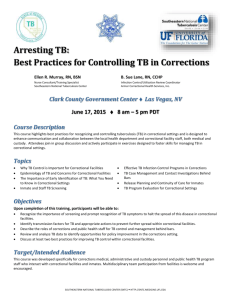SNTC Training Offerings
advertisement
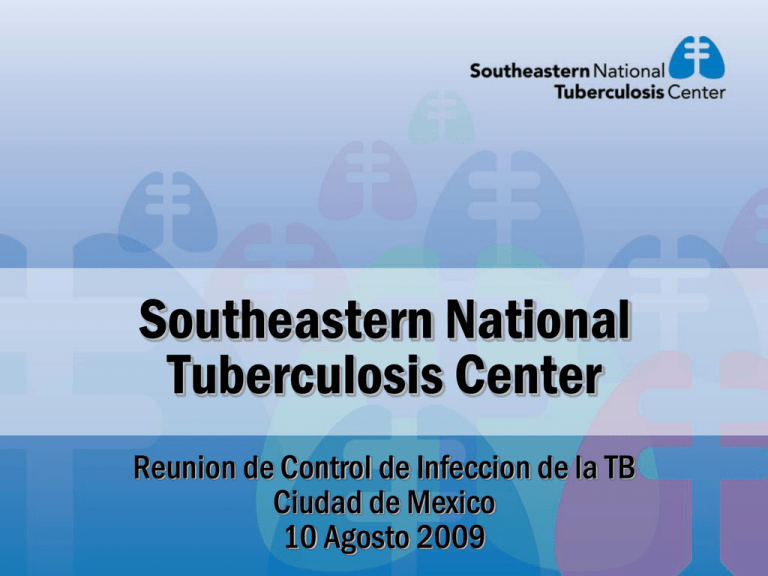
Southeastern National Tuberculosis Center Reunion de Control de Infeccion de la TB Ciudad de Mexico 10 Agosto 2009 What is the SNTC? Southeastern National TB Center • One of four Regional Training and Medical Consultation Centers (RTMCC) in the US. • RTMCCs are funded by the Centers for Disease Control and Prevention (CDC), Division of Tuberculosis Elimination. • The four centers are: – Curry National TB Center – California – Heartland TB Center – Texas – Global Tuberculosis Institute (GTBI) – New Jersey – Southeastern National TB Center – Florida Southeastern National TB Center The SNTC supports the education and training missions of TB programs throughout the region and provides a source of expert medical consultation for healthcare providers caring for TB patients and technical assistance for all TB program personnel. Our region consists of 11 southeastern states, Puerto Rico, and the U.S. Virgin Islands. Southeastern National TB Center Established in 2005 as a collaboration between University of Florida College of Medicine, Gainesville A.G. Holley State (Tuberculosis) Hospital Florida Department of Health, Bureau of TB and Refugee Health CDC funded RTMCC focuses on domestic TB Programs SNTC Gainesville Office SNTC Clinical Training Campus A.G. Holley TB Hospital SNTC Training Offerings • Courses – Comprehensive Clinical TB Course and Clinical Updates – TB Program Management – Contact Investigation Skills – Corrections – TST Train-the-Trainer – Cultural Competency • Webinars • Mini Fellowship Opportunities Spanish Language Capacity • With Puerto Rico in our region, Spanish language skills, translated documents and tools are essential – Five bi-lingual staff • Dr. Lauzardo • Dr. Hamsho-Diaz – Coordinator of Special Projects • Ms. Ottenwess – Health Educator/Training Specialist – Focus on translation of existing critical materials and development of patient educational materials for the Spanish-speaking population ¡Vivir a Todo Pulmón! A Multimedia Toolkit TST Caliper In English and Spanish Spanish Translations Country Guides Country Guides Currently Available… Guides of Most Relevance… Common Misperceptions: Etiology of Tuberculosis Mexico, India, Vietnam, Philippines India, Vietnam, Philippines Smoking Excessive Stress / Worry / Anxiety Drinking alcohol Not eating nutritious foods / malnutrition Genetic inheritance / passed through generations of families Physical exertion or hard work Poor sanitation or hygiene / dirty housing Disruptions in the body’s hot / cold balance (causes vary) Mexico, Philippines A cough (due to a cold or bronchitis) that was not treated and developed into a serious disease Note: While TB is associated with malnutrition, poverty/overcrowded living conditions, individuals view these factors as the direct cause (or etiological agent) of TB disease. Mexico India Vietnam Inhaling ashes, dust or smoke Sexual promiscuity Fate or karma Polluted / dusty environments Bewitchment God’s curse Supernatural causes An evil soul or evil spirit Contaminated water Lack of sleep/fatigue God’s Decision The Philippines Frequent pregnancies Common Misperceptions: Transmission of Tuberculosis Mexico, India, Vietnam, Philippines Sharing items with a TB patient. Examples: Eating utensils, blankets, bed sheets, towels or drinking from the same bottle or glass. Mexico Shaking hands with a TB patient. Sexual relations with an infected person. India Vietnam The Philippines Social contact Spitting Touching a person with TB Heredity From mother to child during pregnancy Sexual Intercourse Bad genes Drinking Water Blood Transfusion Children cannot have TB, the illness only affects adults. Misperceptions: Diagnostic Testing Mexico Routine blood draws can drain a person of energy. India Vietnam No misperceptions X-rays kill blood related to cells and causes a diagnostic testing patient to become found in the tired or turns the literature. skin yellow. The body has a finite amount of blood, and the withdrawal of blood causes an irreversible decrease in the body’s supply. The Philippines X-rays will cause a person to become sterile or develop cancer. The results of an x-ray can be affected by a person’s diet. Examples: Drinking a cup of milk will result in a “negative” chest x-ray Drinking vinegar will cause an x-ray to be blurry. Contact Information Michael Lauzardo, MD, MSc lauzam@medicine.ufl.edu Donna Hope Wegener, MA donna.wegener@medicine.ufl.edu http://sntc.medicine.ufl.edu
